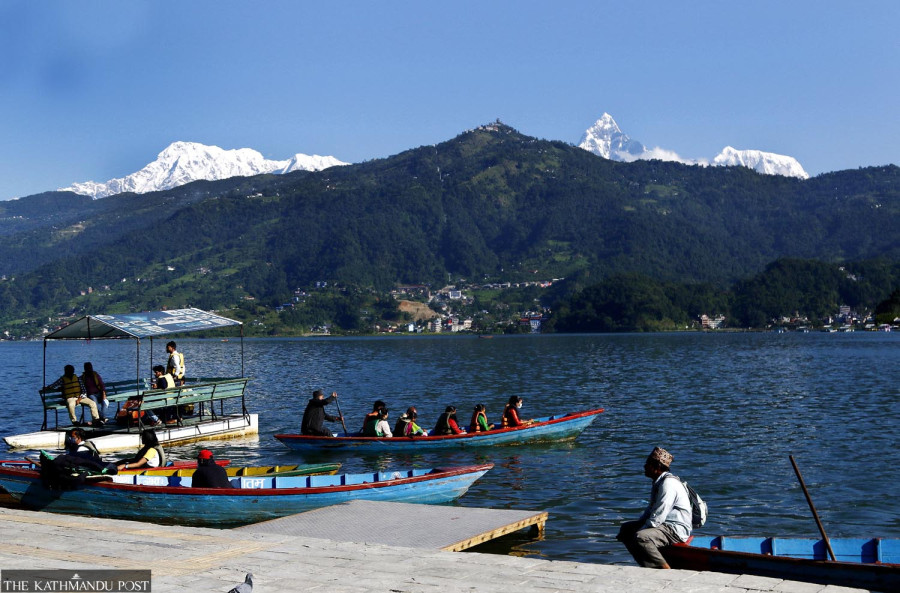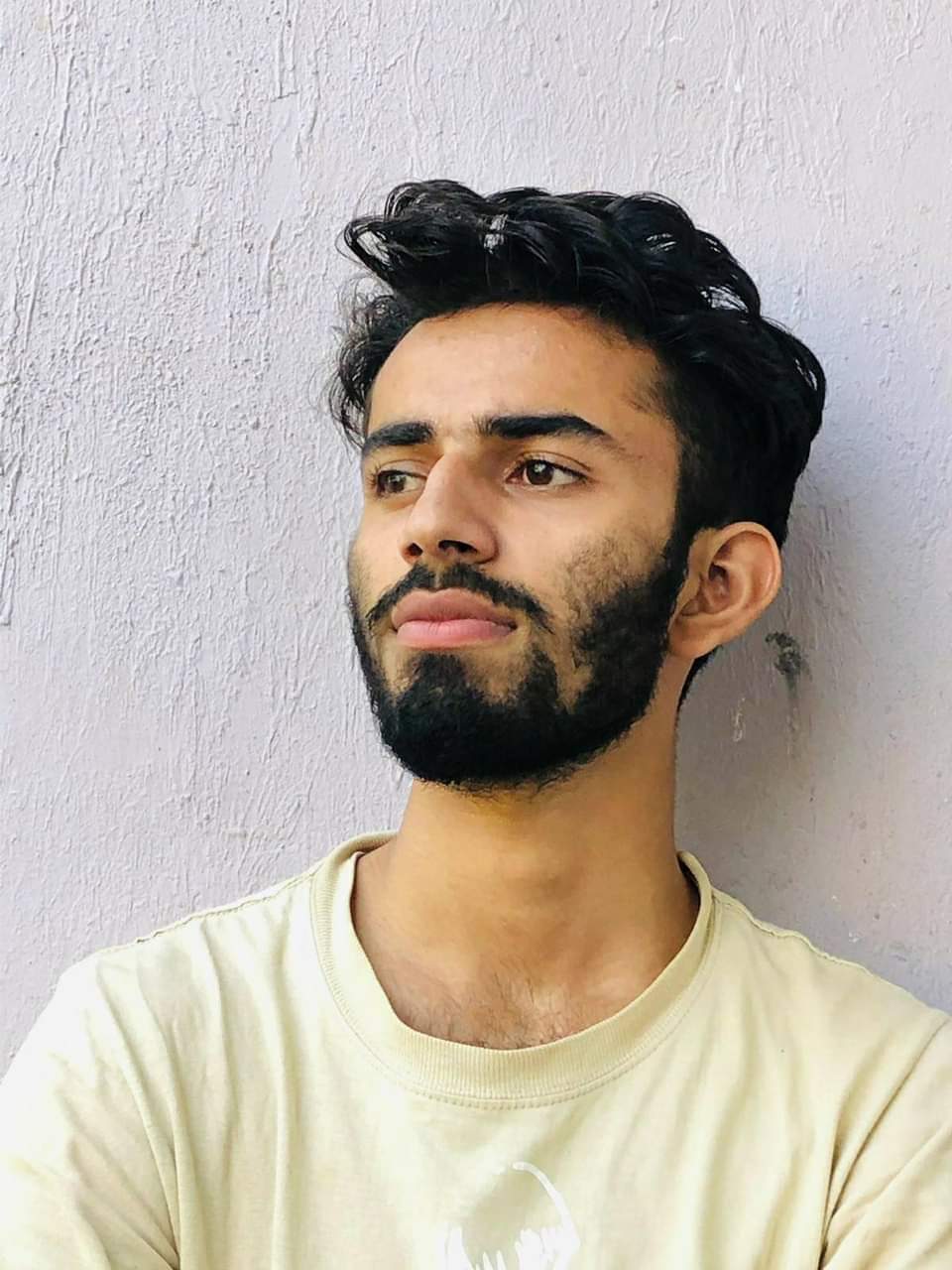Fiction Park
One fine sunny day at the Fewa Lake
‘Any luck, Bire dai?’ the young boy shrieked at the top of his voice and sank into the muddy patch by the lake.
Sugam Gautam
“Any luck, Bire dai?” the young boy shrieked at the top of his voice and sank into the muddy patch by the lake. He held a plastic bag that contained the materials required to set up a fishing trap. A few yards away from the young boy, Bire stooped and ran his hands over the water’s surface. His eyes were wandering through the dense forest on the other side of Fewa Lake. It looked as though he was contemplating deeply, perhaps about national politics or his economic state. At a distance, children were getting ready to dive into the water.
After not getting a response from Bire, the young boy understood that Bire had not caught a single fish. He was always the first at the junction, but his effort hadn’t produced much success.
“Anything wrong, Bire dai?” the young boy inquired again.
“It’s been three hours and not even a single fish. You were sound asleep, so I didn’t bother waking you up. Have you eaten something?”
Strings of perspiration trickled down Bire’s neck to the frayed collars. The heat was unbearable, so he splashed a handful of water against his sweaty face.
The lake was shimmering on this sunny day; the reflection of tall trees fell gently on the lake. The young boy, whose name was Saney, continued to get his stuff ready for fishing. Each day both would come by 11 in the morning and spend their day by Fewa Lake in hopes that fishes would fall into the trap they set. If they were lucky, fishes would take the bait, and they would earn enough for a day or two. On rare occasions, they got to save money for the future as well.
It looked like luck was not in their favour today. This had happened before too. Every fisherman understood that fishing required patience more than any other thing. On days they couldn’t catch a single fish, they would return home with their shoulders drooped in defeat. When they saw a local bus trailing along on their way home, they would talk about their plan to buy a similar bus. Bire would be the driver, and Saney would collect the fare from the passengers. That way, their poverty would give way to prosperity.
Bire and Saney were not the original residents of Pokhara. Bire had come to Pokhara from the hills of Baglung and had found a small Saney in the Bindhyabasini temple on the eve of Maha Shivaratri. Bire had gone to offer prayers, and as he was about to ascend the steps of the temple, he spotted a little kid trying to get hold of the railing. At first sight, Bire thought it was someone’s kid and didn’t pay much attention. He noticed a woman selling raw coconuts and went towards her direction.
But even after Bire returned, the kid stood at the same spot, struggling to get his hands on the railing. It was at that moment Bire grew concerned for the little kid. Bire ambled towards the kid. The kid averted his gaze and looked down at its own slipper-less feet. It looked like he feared facing people’s eyes, which made Bire uneasy.
Kneeling, Bire confronted the kid and asked in a soft voice, “Where are your parents, babu?” The kid pointed his finger at the approaching crowd. Bire thought the kid’s parents were coming to get him. Later he discovered he was wrong, as everyone slipped past him and nobody paid attention to the kid.
“Whose kid is this?” Bire asked in a desperate tone. People turned towards Bire and the poor kid, but no one came forward. He tried to communicate with the kid, but the kid wouldn’t speak. Devotees kept frequenting the temple, holding trays and cradling various flowers. Bire waited an hour, hoping someone would show up, claim the kid and take him away. The kid hadn’t raised his head once throughout the incident.
By judging the kid’s appearance, Bire could tell that the kid had suffered enough in his short life. His pants were tattered in places, and a stream of snot ran down his nostrils. At that moment, Bire was overwhelmed with compassion. Standing beside the temple under the scrutiny of god, Bire thought to himself: “I don’t have any siblings. What if I don’t have someone to look after me as I age? Someone that can take care of me?” He pondered some more. “I have always needed a companion, and god blessed me with this little kid on this auspicious day. My little companion.”
From that day onwards, Bire became “Bire Dai” to the little kid. “From now on, your name is Saney,” declared a gleeful Bire.
When Bire left his village, he sold his little property and aspired to live lavishly in the city. Plus, something propelled his guts: a girl named Nanu, whom he had feelings for since childhood, also lived at a hostel in Pokhara. Nanu had no idea of Bire’s feelings for her, for he had never mustered enough courage to spill them out. He had jumped to the chaos of the city without any proper understanding of how things worked there. Once in the city, he didn’t bother searching for Nanu because he knew she would reject him. She was a studious girl! Why would she like someone like him?
At one point in his life, he’d considered going to the Gulf. But after hearing from people about their hardships, he didn’t even bother to get a passport. His fate had tossed him to Pokhara, a place of possibilities, where he was to toll and change his life.
Initially, he started working as a mason, but the contractor was brutal to him and refused to pay on time. There was no option other than tolerating the cruel contractor, so Bire kept working for months until he was offered to work as a goods loader at the shopping centre. The work was easy, but the money he earned barely covered his and Saney’s expenses. With great reluctance, he gave up the job.
One evening, an officer who’d known Bire from his construction work days nudged him at the market and asked if he could paint the house walls. He mulled this over for a moment and decided to do it. Though it was not an area of his expertise, he couldn’t let go of this golden opportunity. Over the months, he found himself inclined to painting. But the problem was that demand for painters was high only during festival seasons.
When he wasn’t occupied with his painting chores, he would go fishing at Fewa Lake. Saney, who had grown bigger, would cling to Bire’s waist when Bire announced he was going fishing. Saney never liked going to school. He always said, “School doesn’t pay us money. So why should I go and pay them instead?” Bire laughed at Saney’s logic.
How these two lived together without digging into each other’s past showed their love for each other. A question or simple revelation might ruin everything, and both were aware of this. It didn’t matter that they were not connected by blood. What mattered to them was the warmth of the bonding they shared.
After they met, it was as if two missing parts of a puzzle had been sorted into something meaningful. The past year had been hard on them as Bire didn’t get much work. But with Saney grown already, Bire was hopeful that their brotherhood would yield them prosperous times in the future. They had no idea what the future held for them, but they knew that when one stumbled, the other would put in all the effort to prevent his partner from falling.




 9.83°C Kathmandu
9.83°C Kathmandu










